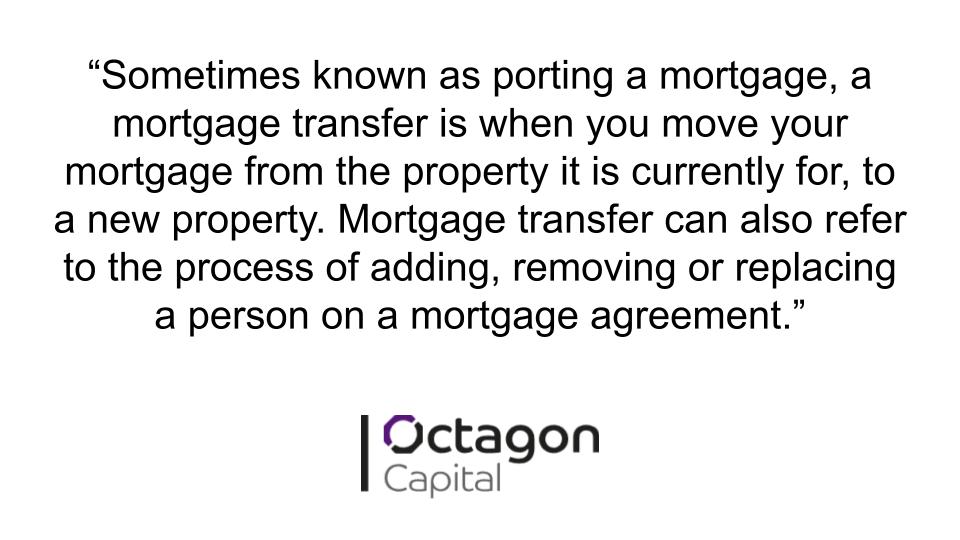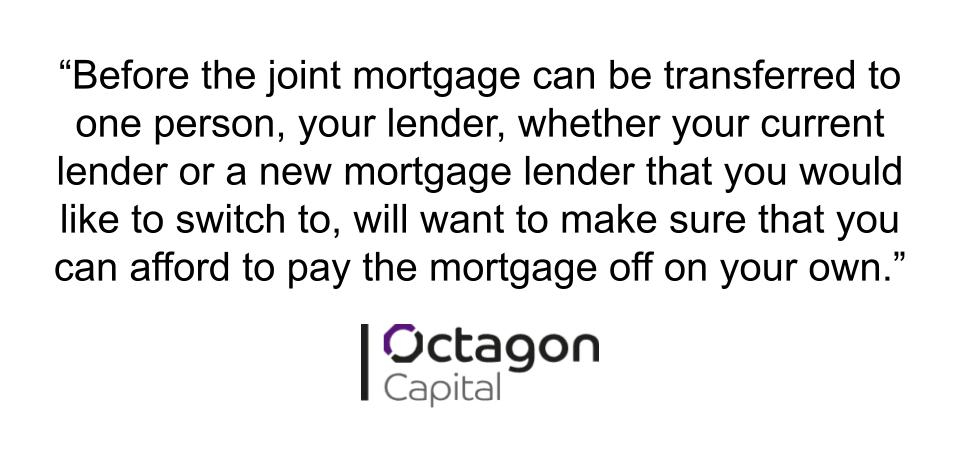Making the decision to transfer your mortgage and completing the transfer is sometimes quick and easy, but can also be a tiresome exercise if you don’t know all the information about the process ahead of you. Oftentimes, when people choose to transfer their mortgage, it has been a considered decision that reflects the best interests of everyone involved – but they still might not have all the knowledge they need to start the process of transferring a mortgage.
In this Octagon Capital guide, we’ve broken down everything you need to know about mortgage transfers, including: what a mortgage transfer is, what an equity transfer is, if joint mortgages can be transferred to one person, if you can move your mortgage to another house, and amongst other things, how mortgages work when you decide to move house.
What is a mortgage transfer?
Sometimes known as porting a mortgage, a mortgage transfer is when you move your mortgage from the property it is currently for, to a new property. Mortgage transfer can also refer to the process of adding, removing or replacing a person on a mortgage agreement, such as in a divorce or separation.
Many people are not very informed of the ins and outs of the process of mortgage transfer, and have many questions when it comes to how it all works. That’s why we’ve compiled this guide of what you need to know when transferring a mortgage – whether to another property or to someone else.
What is an equity transfer?
An equity transfer is where a person on the mortgage agreement is added, replaced, or removed. This is sometimes just known as a mortgage transfer, showing how important it is to know the different terminology that can be used throughout the process to ensure you make the most informed decision you can.
Equity refers to the portion of the property that a person legally owns. This is worked out through the amount of the mortgage that has already been repayed, as well as the split between people on the same mortgage. This equity is then taken on by another person.

Can mortgages be transferred? FAQs
If you’ve never transferred your mortgage to another property or person, it can be difficult to know how it works and which changes are allowed, and which are not. We’ve brought together all of our most frequently asked questions about mortgage transfers and equity transfers to help you throughout your mortgage transfer.
Can a joint mortgage be transferred to one person?
Yes, it is possible to transfer a joint mortgage to one person through a transfer of equity. It’s important to make yourself aware of your lender’s rules or policy on mortgage transfer so you know what to expect.
Before the joint mortgage can be transferred to one person, your lender, whether your current lender or a new mortgage lender that you would like to switch to, will want to make sure that you can afford to pay the mortgage off on your own. They will conduct various affordability checks to make sure you can afford the monthly repayments and will likely check your credit history too.
If the lender deems you eligible to transfer your joint mortgage, one partner usually buys out the other person’s portion of the mortgage. If your lender doesn’t offer what you need, there is the option to remortgage and find a new lender with a better interest rate.
Can a mortgage be transferred in a divorce?
Yes, mortgages can be transferred in a divorce or separation. The same process applies in this instance as for any other instance of transferring a joint mortgage to one person. We’ve covered this in more detail in a previous article, which you can find here.

Can I move my mortgage to another house?
It is possible to move your mortgage to another property – by ‘porting’ your mortgage – in many instances.
However, some people do struggle to port their mortgage. The main reasons why some people struggle to transfer their mortgage to another property is because they no longer pass any revised affordability checks from their lender, or they are looking to borrow a larger sum of money. It’s important to note that being unable to transfer your mortgage is not the same as being unable to swap your mortgage, wherein borrowers are ‘mortgage prisoners‘.
How do mortgages work when you move house?
When you move house to a new property, your mortgage needs to either be transferred to another property or to another person who will become financially responsible for the property. When porting your mortgage to a different property, you can either stick with the same lender if they have a low interest rate, or remortgage with a lender who offers a better interest rate. It’s essential here to check if there will be any exit fees for remortgaging, as these should always be factored into your predicted costs.
As always, before committing and making any big financial decisions, it is absolutely imperative to speak to mortgage advisers and also to make sure that you can afford the move you want to make through a mortgage transfer. Make sure that you are only ever borrowing what you know you can afford to pay back. Defaulting on mortgage repayments or any other loan repayments can result in a cycle of debt due to late fees, as well as a damaged credit score and history.
